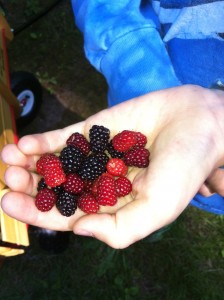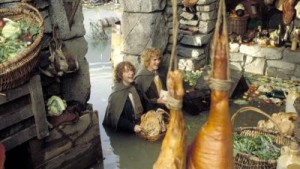(Wild berries picked by my son)
Tolkien doesn’t really write about kids much in his books. There’s only one child in all of Middle-earth who actually has any dialogue (and the answer to this little bit of Tolkien-trivia is at the bottom of this blog post). But that doesn’t mean that Tolkien didn’t like kids. The Hobbits are, in a way, the manifestation of children in Middle-earth. They’re childlike without being childish, if you know what I mean. Bilbo was the first stay-at-home dad in literature, after all, teaching Frodo (and Sam) how to read, write and even speak a foreign language–Elvish!
Tolkien loved his own kids. He wrote them warm and loving letters throughout his life. They were his original audience, starting with his The Father Christmas Letters and all the way through The Lord of the Rings. During World War II, when Tolkien’s eldest son Christopher was away at war, he wrote to him saying that it was difficult to work without “my amanuensis and critic near at hand” (The Letters of J.R.R. Tolkien, #59). And one of the most interesting relationships in the history of literature is Tolkien’s lifelong friendship with Rayner Unwin (the lad responsible for vetting The Hobbit for his publisher father, and then the man who finally got The Lord of the Rings in print).
At the end of The Return of the King, after Sam has sprinkled Galadriel’s magical soil all over the Hobbiton, the Shire-folk experience one of the most “marvellous” summers ever.
“The fruit was so plentiful that the young hobbits very nearly bathed in strawberries and cream; and later they sat on the lawns under the plum-trees and ate, until they had made piles of stones like small pyramids or the heaped skulls of a conqueror, and then they moved on. And no one was ill, and everyone was pleased, except those who had to mow the grass.”
The above passage is one of my favorites in all of Tolkien’s works. All of the terrible sacrifices that Frodo, Sam, Merry and Pippin made on their quest to destroy the Ring were rewarded with this scene of happy, healthy children. And the final moment in The Lord of the Rings, if you will recall, is Sam putting his little daughter on his lap. It’s a beautiful symbol of peace and contentment.
This summer has been “marvellous” for us in the Pacific Northwest. We’ve had the perfect mixture of sun and rain, and my kids have been able to gorge on berries every day just like those kids in the Shire. (And the grass, alas, must be mowed much more than I would like.) These long happy days, where nobody is sick with a cold, are a blessing and a gift.
The other day our friends gave birth to healthy twins. They already have two young children in the house, and not a single relative in town. So my wife and some friends put together a “meal train.” They have divided up days of the week to make hearty meals for this family that suddenly doubled in size. Right now my wife is cooking a gigantic dinner of her delicious homemade macaroni and cheese. And I pulled some fat red beets from our garden and boiled them up for our friends’ beet-loving kids.
If you’ve ever had kids you know that the first days after your child (or children!) are born are utterly and insanely exhausting. Making food is the last thing that you want to think about, but eating well is one of the most important things to do, especially if you have other hungry kids in the house.
What my wife and her friends are doing with the meal train is exactly how I imagine the inhabitants of the Shire helping out with newborns. Can’t you just imagine everyone on Bagshot Row pitching in and feeding Rosie and Sam after the birth of their first child, Elanor, as well as their next dozen kids!
It’s hard on parents in this modern age, when families are spread out thousands of miles around the country (or even the world), for people to raise kids. It’s important to create strong friendships, especially with other parents, otherwise you can really feel isolated.
And hungry.
(Trivia answer: The only child character in Tolkien’s Middle-earth books to have dialogue is Bergil, son of Beregond of Gondor. He is ten at the time of the War of the Ring.)


